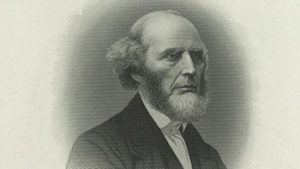
Charles Grandison Finney
*Charles Grandison Finney was born on this date in 1792. He was a white-American Presbyterian minister and abolitionist.
Born in Warren, Connecticut, Finney was the youngest of nine children. Finney, the son of farmers who moved to the upstate frontier of Jefferson County, New York, never attended college after the American Revolutionary War. His leadership abilities, musical skills, six-foot-three-inch stature, and piercing eyes gained him recognition in his community. He "read the law," studying as an apprentice to become a lawyer under Benjamin Wright. In Adams, NY, he entered the congregation of George Washington Gale and became director of the church choir.
After a dramatic conversion experience and baptism into the Holy Spirit, he gave up legal practice to preach the gospel. In 1821, Finney started studies at age 29 under Gale to become a licensed minister in the Presbyterian Church. As did his teacher, Gale. When Gale moved to a farm in Western Oneida County, New York, Finney accompanied him, working on Gale's farm in exchange for instruction, a forerunner of Gale's Oneida Institute. He moved to New York City in 1832, where he was minister of the Chatham Street Chapel and began barring from communion all slave owners and traders.
In 1835, he became the professor of systematic theology at the newly formed Oberlin Collegiate Institute in Oberlin, Ohio. In addition to becoming a widely famous Christian evangelist, Finney was involved with social reforms, particularly the abolitionist movement. Finney frequently denounced slavery from the pulpit, calling it a "great national sin." Finney was twice a widower and married three times. In 1824, he married Lydia Root Andrews. They had six children together. In 1848, a year after Lydia's death, he married Elizabeth Ford Atkinson. In 1865, he married Rebecca Allen Rayl, also in Ohio. Each of Finney's three wives accompanied him on his revival tours and joined him in his evangelistic efforts. He was a leader in the Second Great Awakening in the United States. He has been called The Father of Modern Revivalism.
Finney was best known as a flamboyant revivalist preacher during 1825–1835 in upstate New York and Manhattan, an opponent of Old School Presbyterian theology, an advocate of Christian perfectionism, and a religious writer. Together with several other evangelical leaders, his religious views led him to promote social reforms, such as anti-slavery and equal education for women and blacks. From 1835, he taught at Oberlin College of Ohio, which accepted students regardless of race or sex. He served as its second president from 1851 to 1865, during which its faculty and students were activists for abolition, the Underground Railroad, and universal education. Charles Finney died on August 18, 1875.